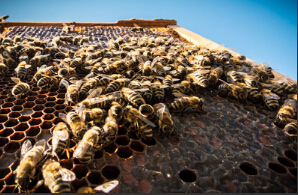(单词翻译:单击)

VANCOUVER, British Columbia — AROUND the world, honeybee colonies are dying in huge numbers: About one-third of hives collapse each year, a pattern going back a decade. For bees and the plants they pollinate — as well as for beekeepers, farmers, honey lovers and everyone else who appreciates this marvelous social insect — this is a catastrophe.
加拿大温哥华——目前,世界各地的蜂群都在大批死亡:每年都有大约三分之一的蜂巢坍塌,这种现象已持续了10年之久。对于蜜蜂及通过它们授粉的植物——还有养蜂人、农民、喜爱蜂蜜的人,以及所有欣赏这种神奇的群居昆虫的人而言——这都是个灾难。
But in the midst of crisis can come learning. Honeybee collapse has much to teach us about how humans can avoid a similar fate, brought on by the increasingly severe environmental perturbations that challenge modern society.
但是,这种危机之中也隐藏着一些学问。蜂巢的坍塌可以提供许多信息,告诉我们当愈加严重的环境问题对现代社会构成挑战之时,人们如何才能避免相似的命运。
Honeybee collapse has been particularly vexing because there is no one cause, but rather a thousand little cuts. The main elements include the compounding impact of pesticides applied to fields, as well as pesticides applied directly into hives to control mites; fungal, bacterial and viral pests and diseases; nutritional deficiencies caused by vast acreages of single-crop fields that lack diverse flowering plants; and, in the United States, commercial beekeeping itself, which disrupts colonies by moving most bees around the country multiple times each year to pollinate crops.
蜜蜂的死亡尤其令人忧心,因为起因并非只有一个,而是有上千种轻微的破坏因素。主要原因包括,农田喷洒的杀虫剂,以及为了抑制小虫直接喷到蜂窝上的杀虫剂所造成的综合影响;带有真菌、细菌和病毒的害虫,以及疾病;由于大面积种植同一种作物而缺乏多种开花植物所造成的营养不足;在美国,商业养蜂人每年都会多次带蜂群在全国各地为作物授粉,这种做法也对蜂群造成了破坏。
The real issue, though, is not the volume of problems, but the interactions among them. Here we find a core lesson from the bees that we ignore at our peril: the concept of synergy, where one plus one equals three, or four, or more. A typical honeybee colony contains residue from more than 120 pesticides. Alone, each represents a benign dose. But together they form a toxic soup of chemicals whose interplay can substantially reduce the effectiveness of bees’ immune systems, making them more susceptible to diseases.
然而,真正的问题并不在于问题的多少,而是问题间的相互作用。我们从蜂群身上得出了一则核心教训,一旦忽视,就会给我们带来危险,那就是协同作用的概念——即一加一等于三,或者四,甚至更大的数值。一般而言,每个蜂巢都含有120多种杀虫剂残余物。单独来看,每种杀虫剂的剂量都是良性的。但是如果放在一起,它们就会形成一种有毒的化学液体,这些化学物质相互作用,会极大地破坏蜜蜂的免疫系统,让蜂群更容易患病。
These findings provide the most sophisticated data set available for any species about synergies among pesticides, and between pesticides and disease. The only human equivalent is research into pharmaceutical interactions, with many prescription drugs showing harmful or fatal side effects when used together, particularly in patients who already are disease-compromised. Pesticides have medical impacts as potent as pharmaceuticals do, yet we know virtually nothing about their synergistic impacts on our health, or their interplay with human diseases.
这些发现所提供的,关于杀虫剂与杀虫剂、杀虫剂与疾病之间发生协同作用的数据集,是所有物种中最为详细的。对于人类,唯一对等的是对药物相互作用的研究。许多处方药在同时使用时,都会表现出有害乃至致命的副作用,对于那些已经生病的患者来说尤其如此。杀虫剂与药物的作用一样强大,但我们其实根本不知道它们会对我们的健康产生怎样的协同作用,也不知道它们会如何与人类的疾病相互影响。
Observing the tumultuous demise of honeybees should alert us that our own well-being might be similarly threatened. The honeybee is a remarkably resilient species that has thrived for 40 million years, and the widespread collapse of so many colonies presents a clear message: We must demand that our regulatory authorities require studies on how exposure to low dosages of combined chemicals may affect human health before approving compounds.
我们应该从观察蜜蜂大量死亡的现象中获得警示:我们自己的健康同样可能会受到威胁。蜜蜂是一种生命力极强的物种,4000万年来,繁衍不息。大量蜂群死亡的现象向我们传达了一条明确的信息:我们必须要求监管机构做出要求,在批准混合药物之前,必须研究低剂量的混合化学物会对人类健康造成何种影响。
Bees also provide some clues to how we may build a more collaborative relationship with the services that ecosystems can provide. Beyond honeybees, there are thousands of wild bee species that could offer some of the pollination service needed for agriculture. Yet feral bees — that is, bees not kept by beekeepers — also are threatened by factors similar to those afflicting honeybees: heavy pesticide use, destruction of nesting sites by overly intensive agriculture and a lack of diverse nectar and pollen sources thanks to highly effective weed killers, which decimate the unmanaged plants that bees depend on for nutrition.
蜜蜂还为我们提供了一些线索,告诉我们如何能与生态系统所提供的服务建立起更具合作性的关系。除蜜蜂以外,还有数千种野蜂也能提供农作物所需的授粉服务。不过野生蜂——即不是养蜂人所养的蜜蜂——也受到了与蜜蜂的境况相似的威胁:大量使用杀虫剂;农耕过于集中造成筑巢区被摧毁;高效除草剂的使用,减少了花蜜和花粉来源的多样性——除草剂大量消灭了作为蜜蜂营养来源的野生植物。
Recently, my laboratory at Simon Fraser University conducted a study on farms that produce canola oil that illustrated the profound value of wild bees. We discovered that crop yields, and thus profits, are maximized if considerable acreages of cropland are left uncultivated to support wild pollinators.
最近,我在西蒙弗雷泽大学(Simon Fraser University)的实验室对生产菜籽油的农场进行了研究。研究发现,野蜂能发挥重要价值。我们发现,如果把相当一部分农田留出来不耕作,而是用来为野生授粉昆虫提供生存资料,那么粮食产量和收入就会最大限度地提高。
A variety of wild plants means a healthier, more diverse bee population, which will then move to the planted fields next door in larger and more active numbers. Indeed, farmers who planted their entire field would earn about $27,000 in profit per farm, whereas those who left a third unplanted for bees to nest and forage in would earn $65,000 on a farm of similar size.
野生植物种类繁多,就意味着蜜蜂也会更健康、种类更多,然后就会有更多、更活跃的蜜蜂飞到旁边的种植区。把所有农田种满的农民,每个农场的收益约为2.7万美元(约合17万元人民币),而对于那些面积相当的农场,如果留出三分之一的农田不耕作,而是供蜜蜂筑巢和搜寻食物,其收益则为6.5万美元。
Such logic goes against conventional wisdom that fields and bees alike can be uniformly micromanaged. The current challenges faced by managed honeybees and wild bees remind us that we can manage too much. Excessive cultivation, chemical use and habitat destruction eventually destroy the very organisms that could be our partners.
这种逻辑与常规观念存在冲突,后者认为我们可以对农田和蜜蜂等事物进行细致入微的管理。但家养的蜜蜂和野蜂目前所面临的挑战提醒却我们,我们或许管得太多了。过度的耕作、化学品的使用和栖息地的破坏,最终会破坏原本能成为我们的合作伙伴的有机体。
And this insight goes beyond mere agricultural economics. There is a lesson in the decline of bees about how to respond to the most fundamental challenges facing contemporary human societies. We can best meet our own needs if we maintain a balance with nature — a balance that is as important to our health and prosperity as it is to the bees.
这种观点的意义不仅在于农业经济学。蜂群数量的减少告诉我们要如何回应当代人类社会所面临的最基本挑战。如果我们能与自然保持平衡,我们就能最好地满足自己的需求——这种平衡对于我们的健康和繁荣很重要,对蜂群也一样。


